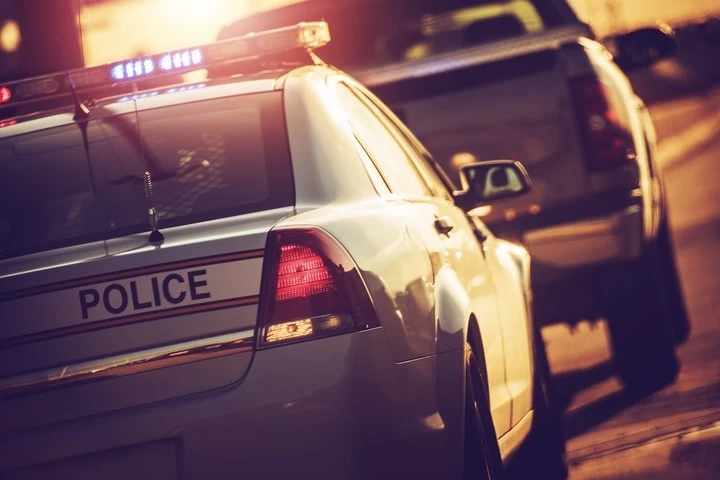
The Texas Department of Transportation reported, in 2022, that one person dies every 7 hours and 43 minutes in an alcohol-related car accident in Texas.
In an attempt to curb such devastating tragedies, Texas imposes serious penalties on individuals charged with driving under the influence (DUI) of alcohol or driving while intoxicated (DWI).
Previous convictions for a DUI or DWI, having a blood alcohol concentration higher than 0.15%, car accidents without injury, and car accidents causing injuries can all increase the degree of crime that a person will face in Texas.
A DWI charge can increase to a third-degree felony if the accused has two prior DWI convictions, OR if the driver’s intoxication caused a crash that resulted in serious bodily injury to another person. A third-degree felony carries the potential for a prison sentence between 2 and 10 years, along with a fine of up to $10,000.
Depending on the circumstances of the arrest, driving while intoxicated may be considered a misdemeanor or a felony.
Misdemeanors typically carry less severe criminal penalties like less jail time and a smaller monetary fine.
The most common felony DWI offenses are DWI 3rd or intoxication assault, which are both third degree felonies.
If you need answers about a DWI arrest or the classification of DWI charges in Texas, contact the San Antonio criminal defense lawyers at Austin Hagee Law Firm today.
Our team has handled hundreds of DWI cases and knows what it takes to aggressively protect our clients’ rights in any situation.
Consult with our office right away to discuss your case and start building your defense.
Is a DWI a Felony in Texas?
A DUI is not a felony in Texas unless specific conditions apply. A third offense, a DWI with a child passenger, or a DWI causing injury or death can elevate the charge to a felony. Most first and second DWIs remain misdemeanors under Texas law.
In Texas, a felony DWI carries severe penalties, including a fine that can go up to $10,000, a maximum prison sentence of 10 years, and the possibility of 800 hours of community service. Additionally, offenders may be mandated to install an ignition interlock device to prevent intoxicated driving.
Texas Penal Code § 49.04 prohibits drivers from operating a motor vehicle while intoxicated. In Texas, “intoxicated” means the driver:
- Lacks the normal use of mental or physical facilities due to the use of drugs or alcohol, or
- Has a blood alcohol concentration (BAC) of 0.08% or more.
But when is this crime a misdemeanor, and when is it a felony?
Misdemeanor
Generally, a DWI charge in Texas qualifies as a Class B misdemeanor, which carries a potential jail term of up to 180 days and a fine of up to $2,000.
And even though the judge has discretion on jail time, there is a mandatory minimum jail sentence of 72 hours or three days, if convicted.
If the driver had an open container of alcohol in their immediate possession, the mandatory sentence for a conviction increases to six days.
If the driver’s BAC was 0.15% or more, the DWI is considered a Class A misdemeanor. In Texas, a Class A misdemeanor carries a maximum potential jail sentence of up to one year and a fine of up to $4,000.
Felony DWI
A DWI charge can increase to a third-degree felony if the accused has two prior DWI convictions. Additionally, a DWI charge can increase to a third-degree felony if the driver’s intoxication caused a crash that resulted in serious bodily injury to another person.
A third-degree felony carries the potential for a prison sentence between 2 and 10 years, along with a fine of up to $10,000.
If you or a loved one finds yourself dealing with this serious of a charge, you’ll want to make sure to hire an attorney that is skilled in the nuances of DWI criminal defense work.
Someone that is prepared to go the extra mile to help you build your best defense. Contact a member of our team today to discuss your options.
Valid Defenses to DWI Accusations
The prosecuting attorney must prove every element of the offense beyond a reasonable doubt. Depending on the circumstances of your case, a legal defense can negate an element of the charge and encourage the prosecutor to dismiss or reduce your charges.
Legal defenses that may apply to DWI charges include:
- You were not operating the vehicle,
- The officer lacked reasonable suspicion to make the traffic stop,
- Your blood or breath sample was collected incorrectly, or
- The results of your blood or breath test results are unreliable due to improper machine maintenance, calibration, or other error.
Our DWI lawyers at Austin Hagee Law Firm understand the elements of a DWI charge in Texas and know which legal defenses can help fight these charges.
Contact Austin Hagee Law Firm, so a member of our team can review the facts of your case and determine if a legal defense applies.
Can I lose my License after a Felony DWI?
Yes, you can lose your driver’s license after a felony DWI conviction. In fact, you will lose your driver’s license automatically after a DWI arrest unless you request a license revocation hearing through the Texas Department of Public Safety within fifteen days.
For a third DWI, you will likely lose your license for between one and two years. Losing your driver’s license can inflict unnecessary stress on you and your loved ones.
Consult with a member of our team, so we can request a license revocation hearing and help you avoid losing your driving privileges. If you lose your license, we can help you get a temporary occupational driver’s license.
Other Consequences of a Felony DWI
Multiple DWIs within a specified time period can result in added requirements for the accused. Felony DWI punishment can require installing an ignition interlock device (IID) inside your vehicle for multiple years.
The IID requires the driver to provide a breath sample without traces of alcohol before they can start the vehicle. If the driver provides a breath sample that registers any alcohol, the vehicle will not start, and the machine will keep a record of the failed sample.
The IID will be legally required to remain on the vehicle until a judge issues an order to remove it from the vehicle.
Additionally, Texas restricts convicted felons from voting until after their sentence or probation is “fully discharged.”
Texas law prohibits individuals with a felony conviction from owning a gun until five years after their release from prison or parole. Thus, a felony DWI conviction can affect your 2nd Amendment right to bear arms.
Texas prohibits anyone with a felony conviction from holding a public office position. The state can also revoke public benefits like Supplemental Nutrition Assistance Program (SNAP) if you receive a felony conviction.
As you can see, a felony DWI conviction can affect you in numerous ways outside stiff criminal penalties. Contact a member of our team today to discuss ways to fight your DWI charge.
Contact a Qualified San Antonio DWI Lawyer Today
With prior experience as district attorneys, our DWI lawyers at Austin Hagee Law Firm know the tactics prosecutors use to convince defendants to accept unfavorable plea agreements and secure DWI convictions.
Our criminal defense lawyers collectively have over a decade of experience helping individuals facing DWI charges. We know what it takes to secure favorable plea agreements or present evidence to get a client’s charges reduced or dismissed.
If you or a loved one are facing DWI charges in Texas, contact our team at Austin Hagee Law Firm today. Our team has the knowledge and resources to defend your constitutional rights.
